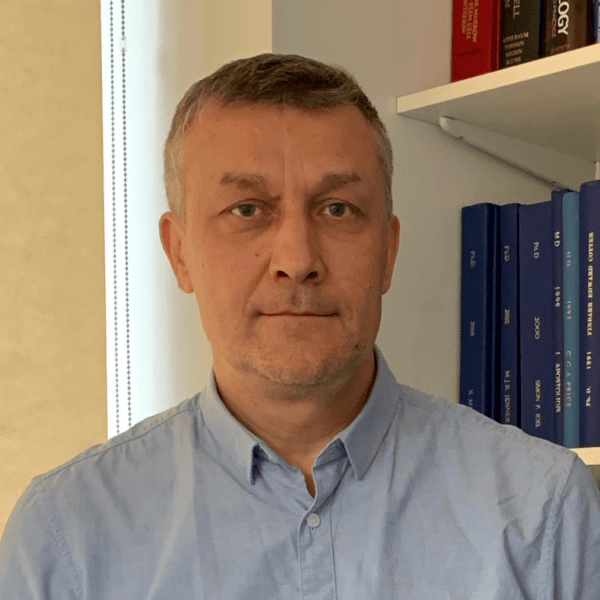Research Focus
My studies concentrate on the immunogenetics of human B cell malignancies, such as chronic lymphocytic leukaemia, follicular lymphoma and the role for B cell receptor in the pathogenesis of B cell lymphoma and leukaemia.
Key Publications
IGHV sequencing reveals acquired N-glycosylation sites as a clonal and stable event during follicular lymphoma evolution. Blood (2020) 135(11):834-844. PMID: 31932843
Lectin binding to surface Ig variable regions provides a universal persistent activating signal for follicular lymphoma cells. Blood (2015) 126(16):1902-10. PMID: 26194765
Identification in CLL of circulating intraclonal subgroups with varying B-cell receptor expression and function. Blood (2013) 122(15):2664-72. PMID: 23954894
Surface IgM stimulation induces MEK1/2-dependent MYC expression in chronic lymphocytic leukemia cells. Blood (2012) 119(1):170-9. PMID: 22086413
Surface IgM of chronic lymphocytic leukaemia cells displays unusual glycans indicative of engagement of antigen in vivo. Blood (2010) 115(21):4198-205. PMID: 20237321
Major Funding
- 2021-2024 - Barts Charity, Functional significance of B-cell associated Epithelial-Mesenchymal Transition (EMT)-like activation in B-cell malignancies, £256,000
- 2016-2018- Leuka, John Goldman Fellowship for Future Science, A novel B-cell receptor - nuclear repressor ZEB2 axis that defines the clinical outcome in chronic lymphocytic leukaemia, £100,000
- 2016-2020- Barts Charity, Strategic Research Grant, Composition of the peripheral blood of CLL patients. Interactions, activation and signalling capacity of B and T-cells, £77,487
Other Activities
- Director of Undergraduate Studies for Barts Cancer Institute, Queen Mary University of London
- Various teaching activities:
BMD211 Human molecular biology module lead
CANM935 Molecular Targeted Therapies and Immunotherapy for Blood Cancers module co-lead - Member of the European Research Initiative on CLL (ERIC)
Research
My primary interest is in the role of B cell receptor (BCR) in the development of B cell malignancies. The immunoglobulin (Ig) – the largest component of BCR – is a key molecule for B cells. Individually constructed during antigen-driven somatic hypermutation of rearranged immunoglobulin V(D)J genes, this receptor is "designed" to recognise a specific antigen. The analysis of the Ig genes allows us to reveal a clonal history of a malignant B cell tracking down a cell of origin.
The BCR signalling, a part of the support received by the CLL microenvironment, provides favourable conditions for CLL cells' survival and eventually, disease progression. Therefore, the dissection of the BCR signalling provides us clues to possible targets for successful therapeutic attack and helps developing new approaches to the treatment of the B-cell malignancies.
Currently, I am leading on a number of research projects looking into the development of B-cell malignancies and the role of the B-cell receptor in B-cell lymphoma and leukaemia.
Other Activities
- Director of Undergraduate Studies for Barts Cancer Institute, Queen Mary University of London
- Various teaching activities:
BMD211 Human molecular biology module lead
CANM935 Molecular Targeted Therapies and Immunotherapy for Blood Cancers module co-lead - Member of the European Research Initiative on CLL (ERIC)
Major Funding
- 2021-2024 - Barts Charity, Functional significance of B-cell associated Epithelial-Mesenchymal Transition (EMT)-like activation in B-cell malignancies, £256,000
- 2016-2018- Leuka, John Goldman Fellowship for Future Science, A novel B-cell receptor - nuclear repressor ZEB2 axis that defines the clinical outcome in chronic lymphocytic leukaemia, £100,000
- 2016-2020- Barts Charity, Strategic Research Grant, Composition of the peripheral blood of CLL patients. Interactions, activation and signalling capacity of B and T-cells, £77,487
Recent Publications
EMT-like Activation in CLL Provides Novel Therapeutic Target Repschlaeger C, Odabashian M, Spada F et al. Blood (2022) 140(10) 12375-12376
Expression patterns of CD180 in the lymph nodes of patients with chronic lymphocytic leukaemia Edwards K, Zaitseva K, Sayed U et al. British Journal of Haematology (2021) 195(7) e131-e134
IGHV sequencing reveals acquired N-glycosylation sites as a clonal and stable event during follicular lymphoma evolution Krysov S, Odabashian M, Carlotti E et al. Blood (2020) 135(1) 834-844
Immunoglobulin Variable Region Gene Sequences Reveal N-Glycosylation Motifs As an Early and Stable Event in Follicular Lymphoma Pathology Odabashian M, Carlotti E, Araf S et al. Blood (2018) 132(1) 4101-4101
PEITC-mediated inhibition of mRNA translation is associated with both inhibition of mTORC1 and increased eIF2α phosphorylation in established cell lines and primary human leukemia cells Yeomans A, Lemm E, Wilmore S et al. Oncotarget (2016) 7(1) 74807-74819
Engagement of the B-cell receptor of chronic lymphocytic leukemia cells drives global and MYC-specific mRNA translation Yeomans A, Thirdborough SM, Valle-Argos B et al. Blood (2016) 127(7) 449-457
T-cell number and subtype influence the disease course of primary chronic lymphocytic leukaemia xenografts in alymphoid mice Oldreive CE, Skowronska A, Davies NJ et al. DMM Disease Models and Mechanisms (2015) 8(7) 1401-1412
Lectin binding to surface Ig variable regions provides a universal persistent activating signal for follicular lymphoma cells Linley A, Krysov S, Ponzoni M et al. Blood (2015) 126(7) 1902-1910
Lectins from opportunistic bacteria interact with acquired variable-region glycans of surface immunoglobulin in follicular lymphoma Schneider D, Minden MDV, Alkhatib A et al. Blood (2015) 125(7) 3287-3296
Stimulation of surface IgM of chronic lymphocytic leukemia cells induces an unfolded protein response dependent on BTK and SYK Krysov S, Steele AJ, Coelho V et al. Blood (2014) 124(7) 3101-3109
For additional publications, please click hereBiography
I studied biology at the Tomsk State University (MSc Biology, 1996, Tomsk, Russia). I then completed my PhD project at the Institute of Clinical Immunology (PhD, 2001, Novosibirsk, Russia). In 2002 I joined the Tenovus Research Laboratory at the University of Southampton. In 2007 I transferred, within Southampton, and joined the Chronic lymphocytic leukemia project at Cancer Research Clinical Centre. In May 2014 I was appointed Lecturer at Barts Cancer Institute, Queen Mary University of London.

